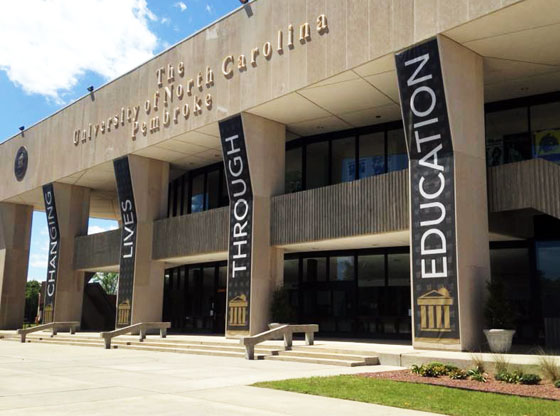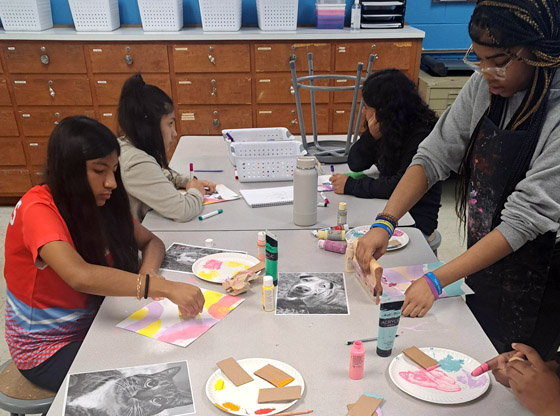The University of North Carolina Pembroke will soon be home to the state’s only public doctoral program in optometry——chartering a new path for comprehensive primary care for eye and visual health in North Carolina and surrounding states.
UNCP received unanimous approval Thursday from the UNC System Board of Governors to establish a Doctor of Optometry program and, in doing so, will be the only public university in North Carolina to grant the specialized four-year degree. The new program will be one of 24 nationwide and will help fill a significant void in the southeastern part of the country. There are no optometry schools in South Carolina, Virginia or Georgia.
A significant milestone for the university, UNCP began exploring the addition of optometry two decades ago under the leadership of then-Senator David Weinstein and UNCP Chancellor Allen Meadors.
That legislative effort in 2004 was part of an evolving mission for UNC Pembroke to meet healthcare workforce needs in southeastern North Carolina, which has continued to the present, said Chancellor Robin Gary Cummings, M.D.
“I’m grateful to our countless supporters who recognize the critical need for comprehensive eye care in our state — particularly in rural areas — and who value the significant role UNCP is playing and will play in ensuring better health outcomes for our communities,” Cummings said. “This addition to our degree offerings reflects our university’s continuing commitment to addressing the evolving healthcare needs of our region and beyond.”
The university will immediately start the process to achieve national accreditation and plans to welcome its first class in the fall of 2027. Over time, graduates will help address the demand for skilled professionals to practice in rural communities, which often have limited access to needed eye care. Currently, there are 12 counties in North Carolina without a single optometrist.
Dr. Max Raynor, former president of the N.C. Optometric Society, supports the university’s efforts and recognizes a burdening unmet demand for quality eye care in rural areas.
“Eye disease negatively impacts many citizens of our state,” Raynor said. “Optometrists take care of the gamut of our patient’s needs, including eye disease treatment and management, well-patient eye care and coordination and aftercare of ocular surgical patients,” Raynor said. “This new state-of-the-art optometry school will go a long way in helping fill that unmet need for all North Carolinians, and I am excited about the possibilities.”
Chancellor Cummings, a former cardiothoracic surgeon, said increasing the number of clinical optometrists providing quality care in North Carolina is a key focus for the new program.
“UNCP’s graduates will be well-prepared to meet the rigorous challenges of modern practice,” Cummings said. “We are committed to teaching the art of critical thinking in applied evidence-based medicine.”
UNCP Board of Trustees Chair Allen Jamerson firmly believes the addition of a second doctoral program, which comes on the heels of launching a Doctor of Nursing Practice (DNP) in January and a Master of Science in Occupational Therapy to launch in fall 2024, continues to raise UNCP’s academic profile.
“It brings a level of prestige and another reason to put eyes on our university,” said Jamerson, a two-time UNCP graduate. “And more importantly, offering optometric medicine will help achieve one of our university goals of improving health outcomes in the region and driving us to our goal of becoming a Top 10 regional university. This takes us to a whole new level.”
Kellie Blue, Robeson County manager and incoming vice chair of the UNC Board of Governors, said she is immensely proud of UNCP’s ongoing commitment to the health and welfare of the community.
“This is monumental,” Blue said. “It further solidifies the key leadership role UNCP plays not only in this region, but across the state of North Carolina.”
In 2018, UNCP began a major push toward a health sciences expansion with the establishment of the university’s College of Health Sciences after a Sheps Center study concluded that programs such as nurse practitioner, occupational therapy, optometry, nutrition and dietetics could improve the supply of health professionals in the region and provide access to well-paying healthcare jobs. The study was repeated in 2023, leading state legislators to budget $20 million for start-up costs associated with new healthcare programs at the university. About $12 million of that funding will support the optometry program.
The state also has earmarked $91 million for the construction of a future health professions building on the UNCP campus. Optometry will be the anchor program in the new facility providing comprehensive educational experiences with the latest diagnostic and therapeutic technology.
The university plans to break ground for the building next year.
“The optometry program will have an exponential impact not only on UNC Pembroke, but on southeastern North Carolina and the state as a whole,” Senator Danny Britt said. “By adding an in-demand doctoral program that is not available at any of the other UNC System schools, UNCP is elevating its profile and helping to positively impact the healthcare landscape of southeastern North Carolina. This is a historic moment for the university, optometry, other health science career fields and especially for rural North Carolina.”
Rep. Brenden Jones described today’s vote as revolutionary.
“This is game-changing for our area,” Jones said. “We’ve been working on this since I got here with Sen. Britt, and now Rep. (Jarrod) Lowery, to ensure funding for UNC Pembroke comes through like never before and the hard work has paid off.
“This will change the face of not only the university but southeastern North Carolina for decades to come,” Jones said.
By 2025, most North Carolina residents will be over 65. The overall demand for medical eye care services is expected to rise due to the aging population. Many optometric clinicians and experts theorize that demand for medical eye care will grow by over 25% by 2030.
“The morbidity rates of systemic conditions like diabetes, hypertension, kidney disease and neurological disorders impact the eye,” said Eva Skuka, M.D., Ph.D., dean of the College of Health Sciences. “The need for optometrists comes from the need for eye care, and the need for eye care services comes from the aging of the population, and diabetes is the No. 1 concern in North Carolina. We have a population that needs healthcare, and eye care is healthcare.”
Along with the doctoral program, UNCP plans to establish a community clinic for uninsured and low-income patients that will provide students with hands-on patient experience under the supervision of experienced clinical faculty.
David Pope, CEO of Scotland Health Care System, said optometrists’ expertise extends far beyond prescribing glasses or contact lenses. By all definitions, they are the primary care doctor for the eye, examining its health, identifying potential eye diseases and using indicators to detect other general health issues.
“One of the quality metrics we measure is based on an eye exam, and our area scores poorly on this because there are not enough optometrists and there’s not enough access to them,” Pope said. “Even if there are other schools graduating optometrists, those people are much less likely to come to underserved, southeastern North Carolina and care for the communities who need the care the most.
“This is why an optometry program at UNCP is important, because UNCP graduates are much more likely to stay in this area and serve local patients,” he said.
Graduates like Dr. Travis Walters (UNCP’18) who traveled away to the University of Pennsylvania College of Optometry at Salus University in Philadelphia to complete his doctoral degree before returning to practice in the area.
“UNCP already has a great nursing program, and optometry students will have the ability to collaborate with nursing students when it comes to studying diabetes and other systemic health conditions,” said Walters, a Bladenboro native. “UNCP is a growing university with a bright future and by adding optometry is helping to address the health of the entire region.”
Contributed/Courtesy photo.



















